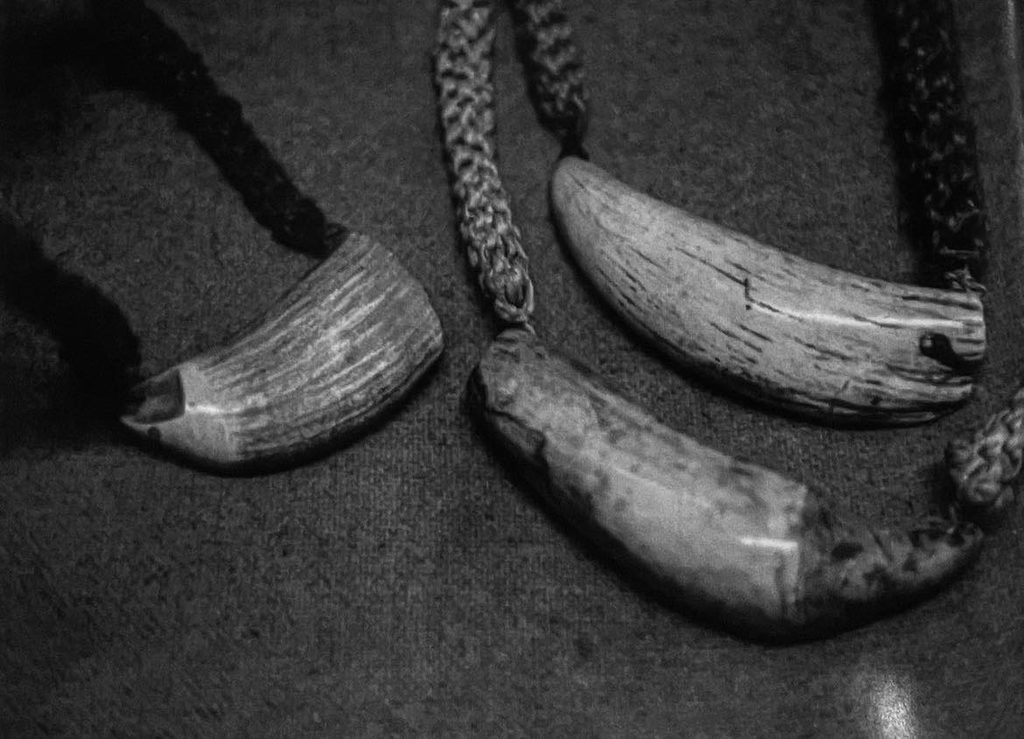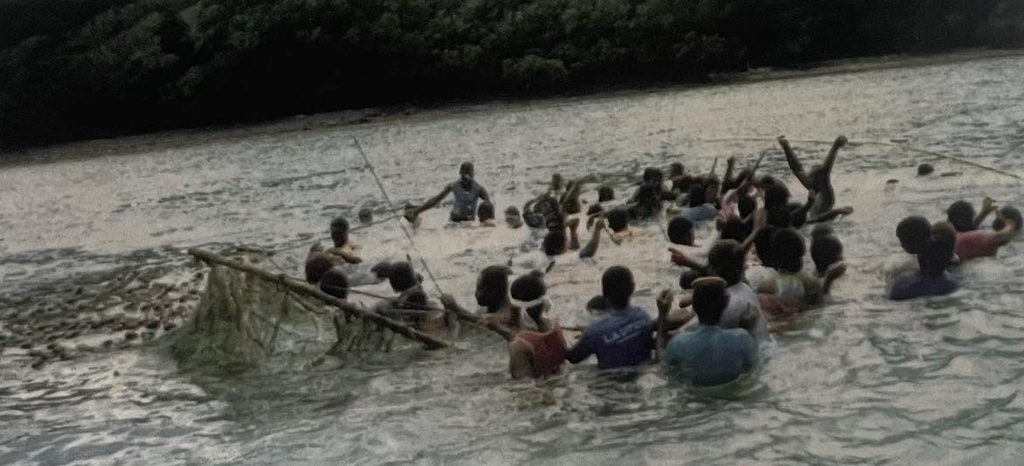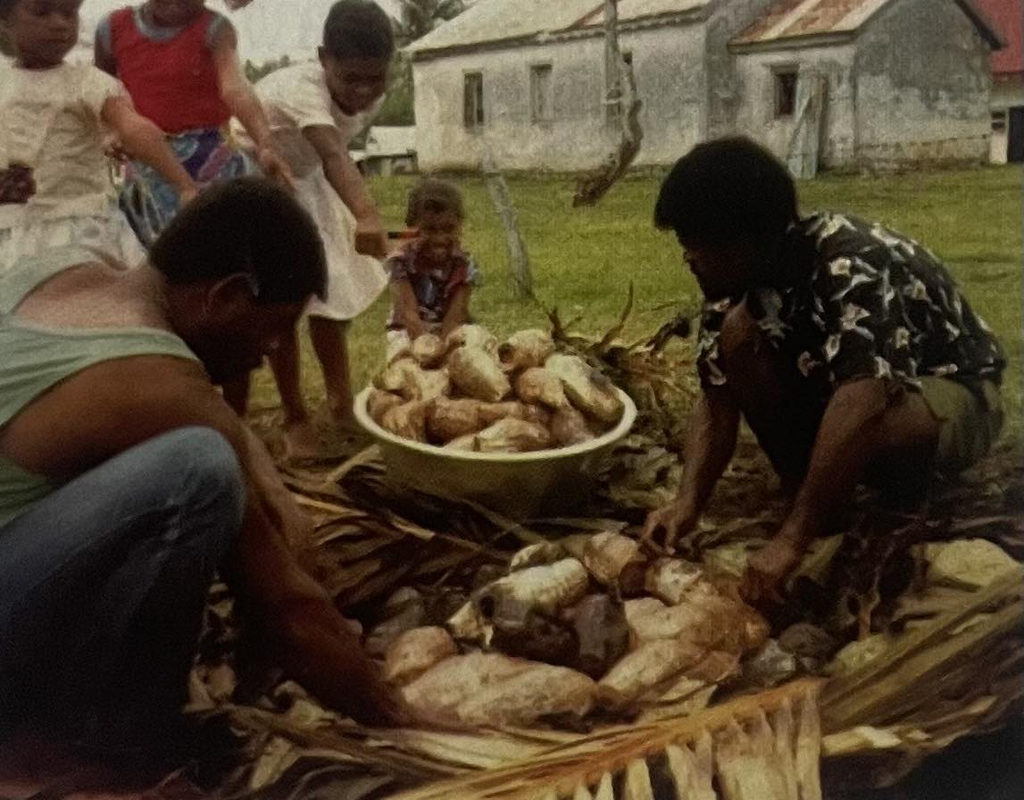AUGUST for the iTaukei is considered the Vula i Cukicuki — a traditional lunar month — a season of preparation, renewal and the symbolic turning of the soil for planting.
It is a time grounded in ancestral rhythms, marked by acts of connection, ceremony, and community responsibility.
In villages across rural Fiji, especially in places like Koro Island, it is a month where the spiritual and the everyday often intertwine, where storytelling, meke, and yaqona sessions carry the wisdom of generations.
For Columban priest Fr Frank Hoare, August 1977 was a deeply immersive period of cultural encounter in Nacamaki Village on Koro.
Over the course of the month, he experienced first-hand the rituals, taboos and sorrows that define village life in Fiji.
A shark, a meke and a sacred ban
“I met the fishermen last night as I crossed the Nacamaki Village green on my way to a dance practice,” Fr Hoare said.
He recounts the evening of August 7, 1977, where he was invited to fish overnight by villagers but chose instead to attend an important vakamalolo meke (sitting dance) rehearsal led by a dau ni vucu (composer).
Days later, the meke would be performed before the chief, accompanied by a ritual presentation involving a whale’s tooth, a symbol of honour and tradition.
That morning, Fr Hoare witnessed the fishermen return with a large pregnant shark.
“I was amazed to see a large shark and three little ones at the bottom of the boat.
“The fishermen said that the shark had given birth to the three little ones when they hauled her aboard.”
Later, a ban on shark killing was pronounced in the village, after a man had speared one in shallow water.
Sharks are considered ancestor gods by some Fijian provinces, and several villagers reported warning dreams in the days following the incident.
Six basins of yaqona
A young man named Savenaca, acting in his role as a police guard, unintentionally offended the people of Veiseisei by sitting on branches of a breadfruit tree, which is a totem for the community.
“He was from Nacamaki and was hot and tired as he stood on police guard at the roadside of the chiefly village of Veiseisei,” Fr Hoare said.
“He moved under the shade of a nearby breadfruit tree, innocently gathered some branches and leaves together and sat on them.
“Some villagers serving yaqona to their chief and guests noticed.
“The breadfruit tree is a totem of the Veiseisei people.
“They were upset to see Savenaca disrespecting their totem by sitting on it.”
The offence triggered a traditional punishment: Savenaca was forced to drink six basins of yaqona as restitution.
Overwhelmed, he silently invoked his ancestral spirit, Tui Naikasi, the turtle god. Entering a trance-like state, he consumed each bowl in one gulp and then demanded the large ceremonial bowl (tanoa) be brought to him.
The incident alarmed the locals until the Veiseisei chief acknowledged Savenaca’s origin, Nacamaki, a village known for its powerful ancestral spirits.
Years later, Savenaca would become a dedicated catechist, but he remained conflicted about that day, revealing a truth Fr Hoare came to witness often: many Fijians live in a dual religious system, balancing Christianity with deeply held traditional beliefs.
A vulo of tabua
“I have been living in Nacamaki Village for six weeks now,” Fr Hoare said.
Now an honorary member of the Manukira clan, Fr Hoare attended a clan meeting where 10 tabua (whale’s teeth) were collected to be offered as a traditional apology.
A youth had eloped with a girl from a neighbouring village, and in accordance with custom, the clan prepared a formal reconciliation gift.
Several tabua were brought one by one, some owned, others borrowed, amid stirring of yaqona and gentle rebukes to the young man in question.
The clan chief reminded him to treat his new bride well, lest the clan’s reputation suffer. And in a moment of levity, one elder quipped: “If any of the rest of you want to elope with a girl, will you please find an Indian girl who is willing!”
A sudden death
After a game of touch rugby on August 22, a young man named Ravuama collapsed and died on the village green.
Fr Hoare spent the evening in solemn vigil with the boy’s father, Ravulolo, brother of the village chief.
“I joined a group of elders and sympathisers who sat with Ravuama’s father, Ravulolo.
“He was a stocky, well-built man, the brother of the village chief, Navuni, and like him, a convert to Catholicism.
“In the intervals there was a murmur of muted voices from different sections of the group. I offered my condolences. Ravulolo sat head bent in sorrowful reflection.
“We sat in silence for long periods. Gradually I could see that he was open to speaking. I asked about his son’s previous health. We agreed that he must have suffered a heart attack.”
However, speculations of sorcery lingered in the background, as often happens in unexplained deaths.
Fr Hoare spoke gently of Jesus’ own suffering and death, offering faith as a light through mystery and mourning.
The following day, he joined the entire village in attending the Methodist funeral service.
“I am a rich man”
Fr Hoare has now completed his two months in Nacamaki Village.
Every day for the past two months, he was welcomed into a different home, sharing in meals as diverse as pie, roti, yams, breadfruit, and lemon grass tea.
He recalls a picnic with his friends Ilimo and Kali, where they roasted fish and garnished it with miti ni wai tu (chili mixed in sea water from a rock crevice.)
They also trekked together across Koro Island, visiting neighbouring villages.
Along the way, Fr Hoare helped prepare the young couple Kali and Dibuna for marriage.
He was struck by the blunt advice of Felise, the elderly catechist, who warned: “Don’t watch the dogs in the village copulating. That will give you wrong ideas.”
In one of his final conversations, Fr Hoare sat with Ilimo in his traditional bure. Surrounded by humble surroundings, Ilimo said: “Father, you probably think I am a poor man when you look around my house and don’t see any fine furniture here.
“But you would be wrong. I am a rich man.”
Ilimo explained that his wealth wasn’t in possessions, but in people, those he had helped, gifted tabua to, played rugby with, and stood by.
“If I need help, I only have to call, and all these people will come to my assistance. Yes, Father, I am a rich man.”
n In next week’s edition of The Sunday Times, we close off 1977 with Fr Hoare, with quite the Christmas gift: a baby, and how he rushed them to the hospital.

A fish drive at Nacamaki in 1977. Inset – The tabua (whales tooth) used for the apology. Pictures: SUPPLIED



